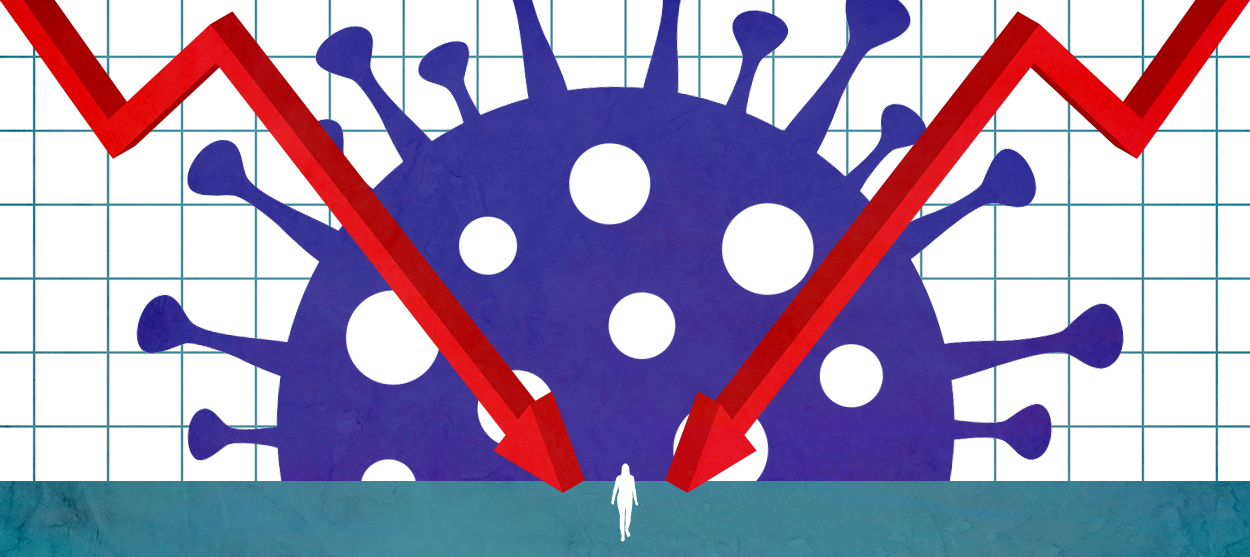For millennials, 'once in a generation' came around twice
We're too young to give up, but too old to start fresh


A free daily email with the biggest news stories of the day – and the best features from TheWeek.com
You are now subscribed
Your newsletter sign-up was successful
On September 11, 2001, I was 14 years old and just a few months into high school. The year I was 16, I took to the streets to protest the war in Iraq. I was just shy of voting age (and not particularly pleased about it) when George W. Bush was re-elected. In 2008, as a college senior watching the economy crater around me, I cast my first-ever presidential vote for Barack Obama. I was almost 30 years old and just a few months married when Donald Trump was declared president-elect.
And now it is 2020. I am 33 years old; I have worry lines and age spots. In just a few short months, America has grappled with a global pandemic, a new Great Recession, and a mass uprising against a white-supremacist and increasingly totalitarian police state. And we're not even halfway through the year.
I grew up absorbing my Baby Boomer parents' stories of adolescence and adulthood: coming of age in the turbulent '60s and the free-loving '70s, settling into white-collar careers and suburban family life in the '80s and '90s. But for the millennial generation — most often defined as those of us born between 1981 and 1996 — the blueprints for economic and domestic stability that our parents' generation embraced are proving impossible to follow. Indeed, we are being squeezed by a machinery that was set in motion long before we were born.
The Week
Escape your echo chamber. Get the facts behind the news, plus analysis from multiple perspectives.

Sign up for The Week's Free Newsletters
From our morning news briefing to a weekly Good News Newsletter, get the best of The Week delivered directly to your inbox.
From our morning news briefing to a weekly Good News Newsletter, get the best of The Week delivered directly to your inbox.
When it comes to the economy, The Washington Post has dubbed millennials "the unluckiest generation in U.S. history." When my peers and I began taking our first steps into a quaking workforce, we were told that the recession into which we'd just launched would be the defining economic experience of our lives. Only now, more than a decade into our independent adult lives, are many of us even beginning to achieve some semblance of job security or financial independence. And just a few months into a global pandemic, we are right back where we started. Many of my peers are losing jobs or having our savings depleted. Once in a generation has come around for us twice.
I'm one of the lucky ones. With a lot of privilege and a little bit of hustle, I've managed to accumulate many of the expected badges of adulthood in the American middle class: a career, a pet, a spouse, a house. I have managed to follow at least some of the blueprint laid down by my parents. And yet, in a society where the only safety net is the amount of money at your disposal, none of this feels comfortable. And all of it feels mildly fictitious — like living in a story written by someone else.
When I talk to my millennial friends about life in These Pandemic Times, we joke bleakly about the challenges of oncoming middle age. Our joints are too busted to march for extended periods on concrete and asphalt anymore. We can't go on socially-distanced hikes or picnics without worrying where to find the nearest restroom. We fret about our kids' screen time while teaching our parents to use Zoom.
But there are deeper concerns. We are losing the resilience of youth, the instinctive trust in our bodies to manage a devastating viral illness. Those of us who rely on employer-provided health insurance are terrified of it being stripped away. My friends and loved ones in "essential" industries are weighing the need for employment against the risk of infection. People with young children are having to make impossible parenting calculations. Many of us have parents in the "over 65" age category, prompting constant roiling worry about their health. And — as recent weeks and months have made inescapably clear — for far too many of my peers, existing in America already presents a daily threat to life and limb. Breonna Taylor was a millennial. So was Ahmaud Arbery.
A free daily email with the biggest news stories of the day – and the best features from TheWeek.com
The conversation turns, too, to politics. So many of us are disillusioned with the established frameworks for enacting change, the ones that worked for our parents when they were young and fiery, but that fell short during the warlike and gaslighting era — the era of WMDs and hanging chads — in which we came of age. Meanwhile, the new frontier of social media activism is noisy and disorienting, fueled by overload and outrage. There is real change to be made, if we can find the right levers to pull. But having the wherewithal to keep searching for those levers, while also keeping ourselves and our families afloat, is an ongoing challenge.
As the COVID-19 crisis shrinks our daily movements and upends our social and family ties, my peers and I are reckoning with a future that is nothing like what we were given to expect. We are grappling with the enormous urgency to act — to protect ourselves and each other, to hold our country accountable for the blood on its hands — while also picking ourselves back up from repeated economic and political body blows. We are simultaneously too young to give up, and too old to start fresh. So where do we go from here?
I have no easy answers. But I do have friends and colleagues who have been striding into the streets, facing down flashbangs and tear gas. Some are working the phones and sending storms of emails. Others are donating as much money as they can. We are reading, and listening, and educating each other. We are sewing masks and 3-D printing face shields. Some of us are making the hard decisions about social interactions and childcare and so much more, for the sake of protecting those around us. We are rethinking our own plans for parenthood, and retirement, and putting down geographic roots. We are figuring out how to break from the script we were taught to follow, in favor of a new unscripted future.
Millennials like me are being squeezed. But we are moving forward and pushing for change, as best we know how.
Want more essential commentary and analysis like this delivered straight to your inbox? Sign up for The Week's "Today's best articles" newsletter here.
Zoe Fenson is a freelance writer based in the San Francisco Bay Area. Her writing has appeared in Longreads, Narratively, The New Republic, and elsewhere. When she's not writing, you'll find her doing crossword puzzles in cocktail bars or playing fetch with her cat.
